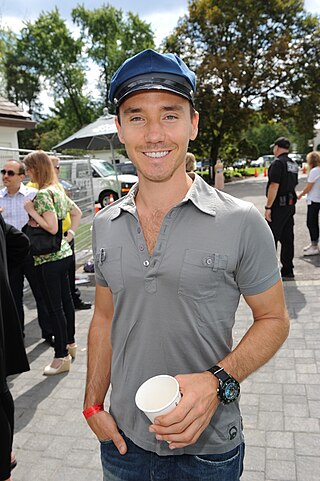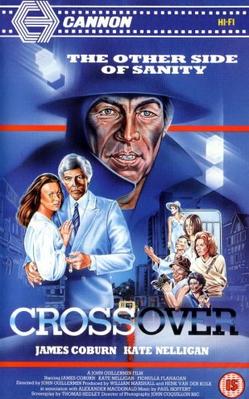Related Research Articles

The Toronto International Film Festival is one of the largest publicly attended film festivals in the world, attracting over 480,000 people annually. Since its founding in 1976, TIFF has grown to become a permanent destination for film culture operating out of the TIFF Bell Lightbox, located in Downtown Toronto. TIFF's mission is "to transform the way people see the world through film".

The Globe and Mail is a Canadian newspaper printed in five cities in western and central Canada. With a weekly readership of approximately 2 million in 2015, it is Canada's most widely read newspaper on weekdays and Saturdays, although it falls slightly behind the Toronto Star in overall weekly circulation because the Star publishes a Sunday edition, whereas the Globe does not. The Globe and Mail is regarded by some as Canada's "newspaper of record".

Howard Leslie Shore is a Canadian composer and conductor noted for his film scores. He has composed the scores for over 80 films, most notably the scores for The Lord of the Rings and The Hobbit film trilogies. He won three Academy Awards for his work on The Lord of the Rings, with one being for the song "Into the West", an award he shared with Eurythmics lead vocalist Annie Lennox and writer/producer Fran Walsh, who wrote the lyrics. He is also a consistent collaborator with director David Cronenberg, having scored all but one of his films since 1979.

Denis Villeneuve is a Canadian filmmaker. He is a four-time recipient of the Canadian Screen Award for Best Direction, winning for Maelström in 2001, Polytechnique in 2009, Incendies in 2010 and Enemy in 2013. The first three of these films also won the Canadian Screen Award for Best Motion Picture, while the latter was awarded the prize for best Canadian film of the year by the Toronto Film Critics Association.

Bruce McDonald is a Canadian film and television director, writer, and producer. Born in Kingston, Ontario, he rose to prominence in the 1980s as part of the loosely-affiliated Toronto New Wave.
Roman Kroitor was a Canadian filmmaker who was known as a pioneer of Cinéma vérité, as the co-founder of IMAX, and as the creator of the Sandde hand-drawn stereoscopic 3D animation system. He was also the original inspiration for The Force. His prodigious output garnered numerous awards, including two BAFTA Awards, three Cannes Film Festival awards, and two Oscar nominations.
Garth Drabinsky is a Canadian film and theatrical producer and entrepreneur. In 2009, he was convicted and sentenced to prison for fraud and forgery. The sentence was reduced from 7 to 5 years in prison, on appeal to the Ontario Court of Appeal, and the Supreme Court of Canada declined to hear a subsequent appeal.
The ACTRA Awards were first presented in 1972 to celebrate excellence in Canada's television and radio industries. Organized and presented by the Association of Canadian Television and Radio Artists, which represented performers, writers and broadcast journalists, the Nellie statuettes were presented annually until 1986. They were the primary national television award in Canada until 1986, when they were taken over by the Academy of Canadian Cinema and Television to create the new Gemini Awards, although ACTRA continued to present Nellies in radio categories.
The Canadian Film Awards were the leading Canadian cinema awards from 1949 until 1978. These honours were conducted annually, except in 1974 when a number of Quebec directors withdrew their participation and prompted a cancellation. In the 1970s they were also sometimes known as the Etrog Awards for sculptor Sorel Etrog, who designed the statuette.

Rob Stewart was a Canadian photographer, filmmaker and conservationist. He was best known for making and directing the documentary films Sharkwater and Revolution. He drowned at the age of 37 while scuba diving in Florida, filming Sharkwater Extinction.

David Acomba is a Canadian television and film producer/director whose television programmes have been featured on CBS, ABC, PBS, CBC, CTV, BBC, Channel 4, Showtime, and HBO.

Mr. Patman is a 1980 Canadian film directed by John Guillermin and starring James Coburn.
Hank Williams: The Show He Never Gave is a 1980 Canadian film. It was released by Simcom Limited and made by the Film Consortium Of Canada.

Helga Stephenson, is a Canadian film industry executive, who served as CEO of the Academy of Canadian Cinema and Television from 2011 to 2016. Following her departure from the Academy, she was made a member of the Order of Ontario.
Van der Kolk is a Dutch toponymic surname, meaning "from/of the kolk". The surname Van der Wiel has a same origin. It could also have referred to a specific settlement or water named De Kolk. People with the surname include:

The Canadian Screen Awards are awards given for artistic and technical merit in the film industry recognizing excellence in Canadian film, English-language television, and digital media productions. Given annually by the Academy of Canadian Cinema & Television, the awards recognize excellence in cinematic achievements, as assessed by the Academy's voting membership.
John Kastner was a four-time Emmy Award-winning Canadian documentary filmmaker whose later work focused on the Canadian criminal justice system. His films included the documentaries Out of Mind, Out of Sight (2014), a film about patients at the Brockville Mental Health Centre, named best Canadian feature documentary at the Hot Docs Canadian International Documentary Festival; NCR: Not Criminally Responsible (2013), exploring the personal impact of the mental disorder defence in Canada; Life with Murder (2010), The Lifer and the Lady and Parole Dance, and the 1986 made-for-television drama Turning to Stone, set in the Prison for Women in Kingston, Ontario.

Marty Gross is a Canadian consulting producer for companies based in North America, Europe and Asia, with focus on Japanese art, film, theatre and crafts. His company, Marty Gross Film Productions, Inc., manages one of the most comprehensive websites devoted to films on Japanese cultural and historical subjects.
Bill Marshall, CM, was a Scottish-born Canadian filmmaker, film producer and theater producer. In 1976, Marshall co-founded the Toronto Festival of Festivals, now known as the Toronto International Film Festival (TIFF), with Dusty Cohl and Henk Van der Kolk. The first Festival of Festivals drew just 5,000 attendees to view 127 films in October 1976. The Toronto Film Festival is now one of the largest film festivals in the world and established Toronto as a major hub for film and cinema. Marshall has been called "a pioneer in the Canadian film industry" for his role in both establishing the festival, as well as expanding the Canadian film-making into a major, nationwide artistic and business sector.
Richard Gabourie was a Canadian actor, screenwriter and film producer, most noted for winning the Canadian Film Award for Best Actor in 1978 for Three Card Monte.
References
- ↑ "Film festival's founders debate who got idea first". Toronto Star , September 5, 1985.
- ↑ "Actors organize Canadian academy". The Globe and Mail , December 13, 1978.
- 1 2 "Expat lives: Split screens". Financial Times , October 26, 2012.
- ↑ "Henk Van Der Kolk took producer's role". Toronto Star , September 10, 1995.
- ↑ "New director announced for film festival". The Globe and Mail , March 14, 1978.
- ↑ "Lights, camera and a remake: Arts power couple are masters at repurposing their home into work space". Toronto Star , November 12, 2016.